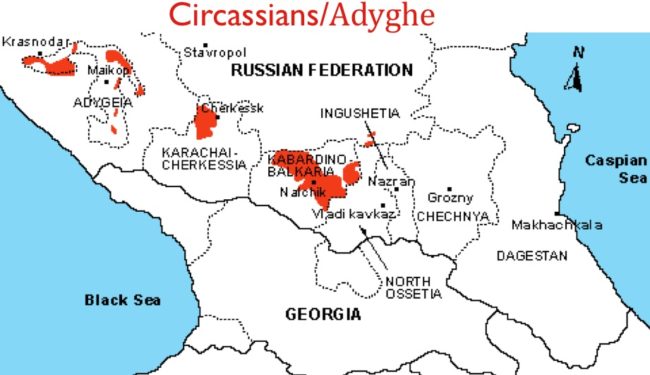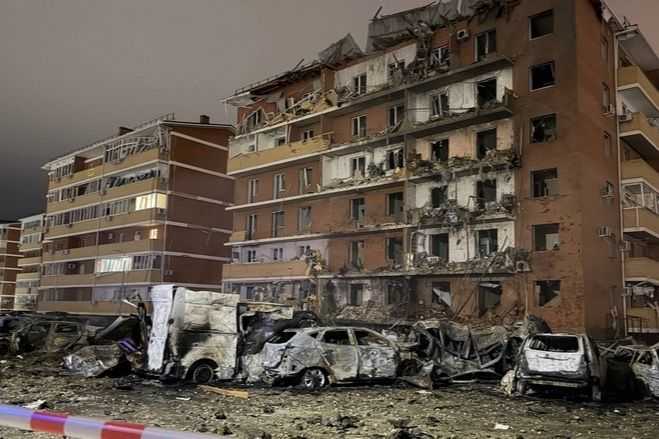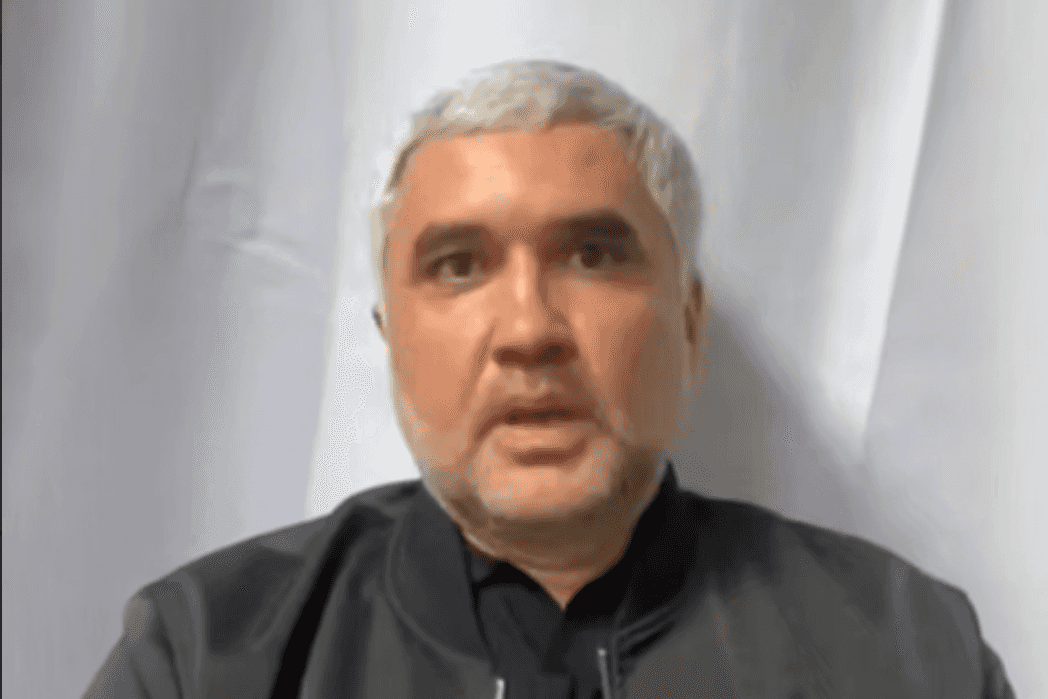

 Officially sanctioned organisations in what was once historical Circassia work almost exclusively to promote Circassian language and culture. Beneath the surface, however, young people espouse more radical ambitions — recognition of the Circassian Genocide, and creation of a united Circassia.
Officially sanctioned organisations in what was once historical Circassia work almost exclusively to promote Circassian language and culture. Beneath the surface, however, young people espouse more radical ambitions — recognition of the Circassian Genocide, and creation of a united Circassia.
In the village of Kbaada (now the ski-resort of Krasnaya Polyana), 153 years ago, a parade was held by Russian troops marking the end of the Russian Empire’s conquest of the Caucasus. The vast majority of the area’s indigenous population were forcibly evicted to the Ottoman Empire.
Lasting for more than 100 years, the Russian–Caucasian War (1763–1864) brought the Circassian people to the brink of extinction. During the war, and as a result of subsequent evictions, Circassia lost about 90% of its territory and its population.
Today, the vast majority of Circassians live outside of their historical homeland, mostly in the Middle East, Europe, and the United States. A total of more than 4 million people in the world identify as Circassian; of these, only about 700,000 live in Russia.

The rebirth of the Circassian national movement
The Day of Remembrance of the Circassian Victims of the Caucasian War, observed annually on 21 May, was established by the Supreme Soviet of the USSR in May 1992, during Boris Yeltsin’s liberalisation policy and the ‘parade of sovereignties’. By that time, a national movement had already been formed by various socio-political organisations in the three North Caucasian republics where the remnants of the Circassian people live — Kabardino-Balkaria, Karachayevo-Cherkessia, and Adygea.
Leaders of the movement were quick to voice their demands at the time — Russian recognition of the Circassian Genocide, the return of historical Circassian lands to Circassian control, and the promotion and restoration of Circassian culture.
However, over time, the Circassian national movement split into two main camps — a legal movement, represented by the NGO community, and an informal shadow movement, where radical sentiments still linger.
Less ambitious designs
Today, officially sanctioned activists openly declare only modest goals. The essence of these are to create favourable conditions for the preservation and development of the Circassian language and traditional culture, as well as popularisation of Circassian history worldwide.
The other group continues to push demands of a more radical nature — Russia’s recognition of the Circassian Genocide, the return of historically Circassian land, and, ultimately, the unification of Circassia as a single state entity. The radicals are no longer represented in any public organisations, from which they were expelled in the late 1990s.
In these organisations, for the time being, the overwhelming majority of activists advocate for legal work within the framework of the Russian constitution. These activists can be divided into those who are sincerely committed to the development of the national culture and strengthening of ties with the diaspora, and those working towards Moscow’s official policy — to decentralise the Circassian national movement and to isolate Russian Circassian organisations from those which operate abroad.

A Russian fifth column
The subversive work of the latter group resulted in a schism between the Federation of the Caucasian Associations (KAFFED) in Turkey, perhaps the biggest Circassian organisation outside of Russia, and the Russia-based International Circassian Association (ICA) — an umbrella organisation for Circassian groups worldwide — which has traditionally been headed by pro-Russian leaders. These leaders caused a split within the ICA after they refused to join protests against the 2014 Winter Olympics in Sochi.
As a result, in December 2016 KAFFED suspended its membership in the ICA. Leaders of KAFFED argued that the leadership of the ICA had failed to deliver on their promises to other movements, and that they didn’t react properly to criticism from within the Circassian community.

KAFFED, headed by Yaşar Aslankaya, was opposed to the 2014 Olympics being held in Krasnaya Polyana, the town where the Russian military conquests were held 153 years ago. The situation was aggravated by the Russian authorities’ decision to ban Aslankaya from entering Russia until at least 2020.
The pro-Russian faction within the ICA declared that they were opposed to interference by Circassian organisations into the policies of countries where other Circassians live. They didn’t explain how Circassians in other countries should otherwise stand up for their interests as a people.
The prestige of the ICA was also heavily damaged because since the beginning of the civil war in Syria, its leadership has done practically nothing to address the problem of Syrian Circassian refugees, their repatriation, and adaptation in their historical homeland.
[Read on OC Media: The unwanted: Syrian Circassians in their historic homeland]
Preserving Circassian traditions

Aslan Beshto, chairman of the Kabardian Congress, believes that the main challenge currently facing Circassians is the preservation of their native language. He says that preserving Circassian is key to their ethnic self-awareness. When asked about the strategic goals facing the Circassian ethnic group, he said the following:
‘Today, the question of returning once lost territories to Circassians is not worth talking about and people who are seriously engaged in politics don’t raise it. We, Circassians, must deal with more urgent problems — to develop national self-awareness among young people through the language and culture. As for the “return of ancestral lands”, please, God, let’s take care of and develop those which we inhabit now’, Beshto told OC Media.
Talking about interference by the Russian authorities into the organisation of legally approved commemorative events, in particular the seizure of mourning ribbons with Circassian national symbols on the eve of 21 May, Beshto said:
‘All of this happens because “on top” there is no common opinion on the so-called “Circassian question”. Here one can cite a popular saying born in the highest echelons of power in the Russian Federation: “There are seven towers in the Kremlin and none of them loves the other”. I think that all sorts of excesses occur because of the inconsistency in the decisions of politicians with the actions of siloviki (power structures)’, Beshto said.

Uvzhuko Tkhagapsov, editor-in-chief of the Karachayevo-Cherkessian newspaper Cherkes Kheku, told OC Media that the root of all problems in the Circassian national movement is that ‘politicians who officially represent territorial units where Circassians are a titular nation do little to address the issues of national rehabilitation and the problems of repatriates. They have all the means necessary to do so. In such conditions, these problems are beginning to be addressed by non-professionals on the ground — representatives of creative and technical intelligentsia, informal leaders, and others. Hence the conflicts with the authorities and with colleagues from the diaspora’.
Asker Sokht, deputy chairman of the public organisation Adyge Khase in Krasnodar Krai also believes that ‘the main tasks facing Circassians as an ethnic group include preservation of their language and culture as well as supporting the process of repatriation and integration of repatriates into Russian society’.
Focusing on the problem of preserving and developing the Circassian language, Asker Sokht told OC Media: ‘Previously, a child from a Circassian family came to school already speaking the language. At school the child was taught only grammar, writing, reading, and Circassian literature. Today, many Circassian parents don’t speak Circassian at home and schools aren’t prepared to teach children from the very basics. Thus, we risk losing our defining ethnic marker — our mother tongue’.
Representatives of Circassian organisations that work officially in Russia do not advocate for issue like the recognition of the Circassian Genocide or the return of historical Circassian lands.

Dreams of a reunified Circassia
However, the number of young people who support the recognition of the genocide and the unification of Russia’s southern regions of Kabardino-Balkaria, Karachayevo-Cherkessia, and Adygea, is steadily growing. It is young people who attend events such as Circassian Memorial Day on 21 May and Circassian Flag Day on 25 April. They come from a whole range of social groups.
For instance, Khasan, a teacher at a local university, told OC Media that he believed in a unified Circassian state.
‘Today’s Circassian public associations are afraid to touch upon the main issue — the creation of a single Circassian state formation. Such a formation should include parts of the lands which were taken away in the 19th century, since without them, it is impossible to speak of a fully-fledged repatriation and territorial merger of Kabarda, Cherkessia, and Adygea. Only as a single state formation, can Circassians avoid assimilation’, Khasan said.
A single Circassian language
Twenty-one-year-old Sarazhdin, from a village in Kabardino-Balkaria, said that he understands and welcomes the efforts of public organisations to preserve the language and popularise the traditional culture of his people. He laments the fact that Circassian is currently formally divided into two competing literary standards — Kabardian and Adyghe.
‘But if you remember that Circassians who live in Russia still don’t have a single standard of grammar or a single official language, it becomes clear that in a unified republic, Circassians would quickly solve their linguistic differences and other issues relevant to preserving their nation. Amongst Circassians there are important scientists, experienced politicians, military leaders, and businessmen. They could fully constitute a ruling elite. In a word, we need to achieve not only the recognition of the genocide, but also territorial rehabilitation. Not at the expense of the neighbouring republics, but at the expense of the Caucasian Mineral Waters region [the southern part of Stavropol Krai], part of the Kuban region [Krasnodar Krai], and the eastern Black Sea coast’, Sarazhdin said.
Khaled, a Circassian man from Syria, told OC Media that he also dreams of a single Circassian state in the future.
‘This idea seems unfeasible only at first sight’, Khaled said. ‘But remember the history of the creation of the State of Israel, remember the recent appearances of Croatia, Bosnia, Slovenia, Kosovo, Abkhazia, East Timor, and other countries on political maps. Soon Catalonia will become independent. Nothing is impossible.’
According to the people OC Media spoke with, many young Circassian activists support the idea of creating a single Circassian state, whether as an independent entity or as a unified republic within the Russian Federation.
There is a feeling among activists that anyone who can master the minds of the patriotic youth will lead the Circassian national movement in the future. However, no such leader has so far emerged.








